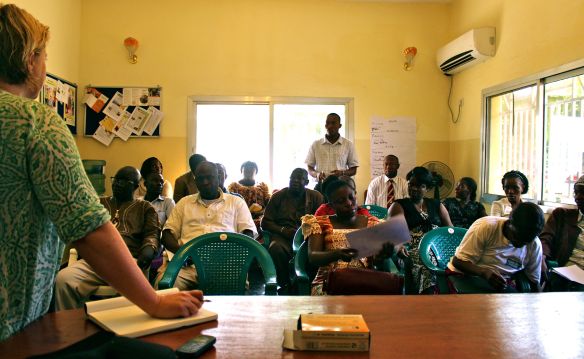I am very fortunate to hold two roles with the Connecting People Intervention: one, as the full-time London based research worker on the pilot study, and two, as a part-time PhD student exploring the international scope of the intervention model. To address the wide gap in global mental health implementation research and to promote capacity building of researchers in lower-and middle-income countries, I am working on expansion of the Connecting People Intervention to under-developed contexts that currently lack critical resources and skills.
Juggling two roles is not unfamiliar to me, for several years I have pursued my career in psychology research whilst also serving as a director for the small African development charity, SpanAfrica. But until very recently these two passions for me—the drive to inform evidence-based research and to support meaningful change in underdeveloped countries—have not converged. This is precisely the reason I jumped at the opportunity to explore the feasibility of taking the UK-based Connecting People Intervention to low- and middle-income countries (LAMICs).
I believe the Connecting People Intervention model has great potential to enhance health and wellbeing of vulnerable populations in LAMICs, especially with its focus on social participation. I see the intervention as an opportunity to enhance social relationships between individuals whilst also developing the local community through existing services. But most importantly the intervention model we have developed in the UK cannot simply be imposed on communities across the globe, instead my PhD will explore the ways that the CPI can be adapted to fit the local context.
With a background in health psychology and experience working in severely disadvantaged areas of Africa, I am often challenged by the varying approaches to addressing health inequalities through sustainable development. We see blanket approaches where non-governmental organisations and international institutions will address seemingly similar issues exactly the same across vastly different countries or regions.
A story comes to mind of an NGO who visited a small rural town and asked male leaders what they needed most for their community. They responded, “a water well” because the women had to walk miles each day to access clean water. The well was constructed but shortly after installation many people in the community fell ill and they determined it was the new well. What the male leaders didn’t understand was how important that daily walk was for the women. It was their time for socialising, peace, and exercise. One woman missed that time so much that she began contaminating the well water just to have that time back. This is a story that reminds us the importance of truly addressing the needs of the entire community. Whilst the NGO had good intentions, and even worked with the local leaders, it wasn’t sustainable to the entire community. Of course clean water is vital but perhaps the NGO could have consulted the entire community and in addition to providing clean water also considered opportunities for social participation.
Integral to conducting research in LAMICs is the need to establish strong relationships with key stakeholders to capture a realistic description of the challenges faced by vulnerable adults in the community. Recently I have been collaborating with individuals from the King’s Centre for Global Health to explore the possibility of piloting the Connecting People Intervention in Sierra Leone. The connections we are making now will enable us to reach individuals across health and social care systems in Sierra Leone to engage with community-based organisations, medical professionals, religious and community leaders, other mental health researchers, policy makers, and importantly, service users. Connecting with these individuals in the research development stages, we seek to find the critical balance between addressing local needs in Sierra Leone with the innovative approaches that have been found effective in the UK.
We have developed a multinational research network that draws expertise and skills from diverse disciplines including social work and social policy, social and health psychology, medicine and nursing, global health policy and international development. As a team we are scattered across the United Kingdom, Sierra Leone, and Australia with connections around the globe in these diverse fields of research and practice.
In order to assess the feasibility and acceptability of the CPI in Sierra Leone, we are arranging travel to Sierra Leone to engage with local stakeholders and gain a better understanding of the mental health services available as well as identify where significant gaps exist, forming the foundation for a needs assessment. Drawing upon the extensive network of our international research team members in Sierra Leone we will use ethnographic methodology to gain a comprehensive description of the local context. This work will establish the potential for the model to benefit the outcomes for service users and inform the planning the protocol for a future pilot study.












